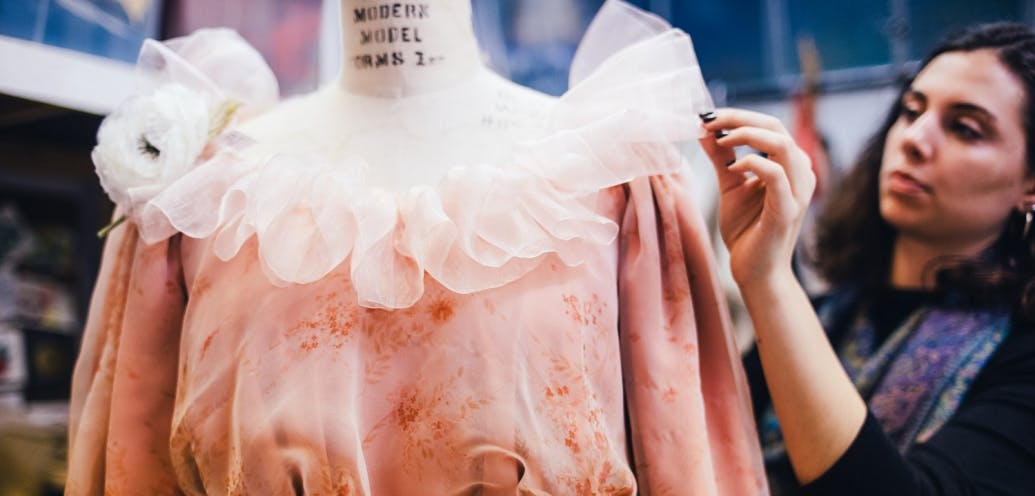Seattle Pacific University’s new costume design and production major and minor is a collaboration between the Departments of Theatre and Family and Consumer Sciences.
For nearly three years since Disney’s hit musical Aladdin opened on Broadway, Bonnie Prather ’07 has worked as the dresser for three performers in the female ensemble. For eight shows in six days each week, she brings them their show underwear; irons, steams, and repairs their costumes; and helps them backstage with quick changes. After the final bow, she helps them out of their costumes and delivers laundry to the laundry room.
Prather “couldn’t be happier” to learn that this is the inaugural year of Seattle Pacific University’s new costume design and production major and minor. To realize her dream of becoming a costume pro, as an undergraduate she had to stitch together a combination of classes in two departments: Theatre (for comprehensive production skills) and Family and Consumer Sciences (pattern drafting and advanced sewing skills).
“I’m paid an excellent wage,” says Prather, who as an SPU student worked part time with top Seattle theatres before tackling a master’s degree in costume design from Arts University Bournemouth in the U.K. This year her Broadway union wages allowed her to make trips to New Zealand, France, and back to SPU for the 2016 Grand Reunion, where she was honored as a notable graduate, one of “125 Ones to Watch.”

Working hard to make the streamlined costume design major happen for today’s students is Sarah Mosher, a 2002 SPU theatre major, adjunct instructor, and coordinator of the new program. She has taught the costume design course since 2009 and has designed costumes for every SPU mainstage theatre productions for the past three years. Her work on King Lear received a commendation from the Kennedy Center American College Theatre Festival.
“This major is unique in the region and among schools in the Christian Colleges Consortium,” says Mosher. “Our emphasis is on student professionalism, the highest standards, and exposure to guest directors and designers in the industry. As people created by the Creator to create, shouldn’t we take the lead?”
Through the study of general theatre, stagecraft, fashion design, clothing construction, and more, students gain the preparation and skills to become costumers, wardrobe managers, and costume designers in professional theatre, film, dance, or other performance genres. Other options include working as a stylist in the fashion industry, a proprietor of a costume shop — or in Mosher’s case, a popular teacher of costume magic.

Prather has worked theatre productions in London’s West End, and now in New York. As a student, she was inspired whenever Mosher would return to SPU to design a show. “It was incredibly helpful to see another young woman who loved costuming and knew how to make a career of it.”
Mosher loves telling stories visually, something costume designers and wardrobe dressers understand. Aspects of a character’s journey can be hidden, revealed, or otherwise influenced through clever costume changes and design.
Senior Lydia Megalaa of Cairo, Egypt, will graduate this year with a major in English literature and a minor in costume design. In the future, she’d like to work in the film industry as a writer and costume designer. While at SPU, she has worked in the costume shop on four different theatre productions.
Costume design and production takes advantage of rich resources in both Theatre and Family and Consumer Science. Megalaa says her favorite course so far has been “Global Dress and Behavior.”
“Coming from a multicultural background, I find that it is no longer enough to just have an understanding of Western history and tradition to be a fully rounded designer, or fully rounded member of the artistic community in general,” she says. “The future of the film and theatre industries is becoming increasingly inclusive.”




